
Spring has sprung in L.A. big time with the sensational Los Angeles intimate theater debut of Spring Awakening, the Steven Sater/Duncan Sheik musical adaptation of Frank Wedenkind’s groundbreaking 1891 drama.
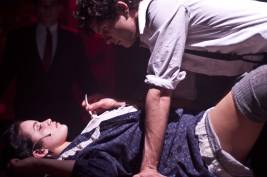 The original German play broke plenty of ground indeed with its depiction of on-and/or-offstage masturbation, child abuse, bondage, rape, abortion, and suicide among 14-year-olds just now awakening to their sexuality. No wonder Wedenkind’s late nineteenth-century shocker wasn’t staged on Broadway until 1916 and ended up closing after a single performance.
The original German play broke plenty of ground indeed with its depiction of on-and/or-offstage masturbation, child abuse, bondage, rape, abortion, and suicide among 14-year-olds just now awakening to their sexuality. No wonder Wedenkind’s late nineteenth-century shocker wasn’t staged on Broadway until 1916 and ended up closing after a single performance.
Very much a groundbreaker in its own way, Sater and Sheik’s musical has proved considerably more successful than its source material, winning eight Tonys including Best Musical, Book, and Score. Now, following nearly 900 performances on Broadway and two National Tours, Spring Awakening may be even more powerful and exciting seen up close and personal, especially in a production as thrilling as this one.
Spring Awakening (The Musical) follows Wedekind’s storylines, though thankfully not too much to the letter. (A non-musical version reviewed here in 2008 revealed the original drama to be both stilted and perplexing.) There are its two teen heroes, the handsome, popular, self-confident Melchior (Mat Vairo) and his introverted, inhibited, wet-dream-plagued classmate Moritz (Chase Williamson), and its heroine, the all-too-innocent but no less sexually inquisitive girl-next-door Wendla (Lindsay Pearce). There are also Melchior and Moritz’s ever-horny classmates and Wendla’s equally randy girlfriends. A pair of more seasoned actors (David Carey Foster and Kelly Lester) stand in for all the adults in these teens’ lives.
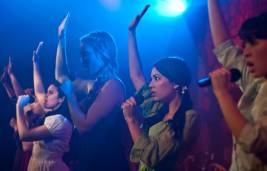 What makes Spring Awakening work so brilliantly is not just Sater’s streamlining of Wedekind’s melodramatic plot threads. Singer/songwriter/pop star Sheik’s catchy alternative rock score, the likes of which has probably never before been heard on a Broadway stage, and Bill T. Jones’ brilliantly innovative choreography together turned Spring Awakening into a mainstream (and cult) international phenomenon.
What makes Spring Awakening work so brilliantly is not just Sater’s streamlining of Wedekind’s melodramatic plot threads. Singer/songwriter/pop star Sheik’s catchy alternative rock score, the likes of which has probably never before been heard on a Broadway stage, and Bill T. Jones’ brilliantly innovative choreography together turned Spring Awakening into a mainstream (and cult) international phenomenon.
For this reviewer, the magic in Spring Awakening begins when the mikes (or mics, if you prefer) come out. The show begins quietly, with sexually burgeoning Wendla wondering if she’ll ever be told the truth about man-woman relations in “Mama Who Bore Me,” followed by a very funny sequence in which her highly embarrassed mother avoids the question entirely, an omission which proves ultimately disastrous. The song takes on a rock beat as Wendla’s girlfriends join her in a reprise, mikes in hand, but it’s a bit later that the hand-mikes begin to take on a life of their own.
Melchior and Moritz are in Latin class, the former attempting to rescue the latter from the ire of their monster of a teacher, when the burning need to express what’s going on inside their minds and bodies suddenly erupts. As the first chords of “The Bitch Of Living” sound from the onstage band, Melchior draws from within his school uniform a previously-hidden mike, a gesture so defiant—and unexpected—that the first time I saw it I became a Spring Awakening fan for life. (Director Kate Sullivan has remarked that it’s the mikes that give these misunderstood teens their power and their voice.)
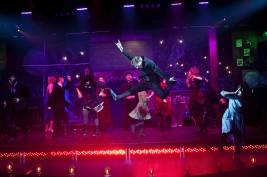 Without imitating Jones’ Tony-winning choreography to the letter, choreographer Laura Harrison makes savvy use of the innovative stomps and back kicks and leaps and jumps that characterized Jones’ cutting-edge dances. It’s as if every adolescent urge just bursting to break free now finds itself expressed in dance. The most striking illustration of this comes in Act Two’s “Totally Fucked,” which has the entire cast contorting as if their sexual wants and their dissatisfaction with the world around them were ants crawling all over their bodies and driving them insane with pent-up desire, anger, and frustration.
Without imitating Jones’ Tony-winning choreography to the letter, choreographer Laura Harrison makes savvy use of the innovative stomps and back kicks and leaps and jumps that characterized Jones’ cutting-edge dances. It’s as if every adolescent urge just bursting to break free now finds itself expressed in dance. The most striking illustration of this comes in Act Two’s “Totally Fucked,” which has the entire cast contorting as if their sexual wants and their dissatisfaction with the world around them were ants crawling all over their bodies and driving them insane with pent-up desire, anger, and frustration.
Spring Awakening works equally well in its quieter moments, which feature some of Sheik and lyricist Sater’s most memorable compositions. The Pink Floyd-esque “Touch Me,” in which the youthful cast of characters express their desire for intimate physical contact; the anthem-like “I Believe,” which sets the stage for Melchior and Wendla’s sexual flowering; and the exquisitely sad “Left Behind,” sung at a funeral for one of these teens are just three among many such songs.
Without these musical numbers, Spring Awakening would simply be an abbreviated version of the play I saw prior to the musical, albeit skillfully abridged by book-writer Sater. With them, it becomes something extraordinary, in which contemporary music makes the struggles of nineteenth-century adolescents seem every bit as relevant to today’s teens as the ones they face on a daily basis, as if twenty-first century souls were inhabiting these long-deceased youths. Melchior, Wendla, and Moritz may have been born in the 1870s, but their dilemmas (like the consequences of Wendla’s insufficient sexual education) still ring true in 2012.
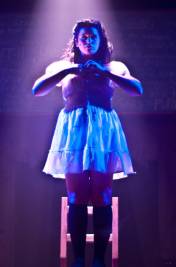 Not since Rent has there been a major musical with so many parts for young triple threats, and what an exciting cast Over The Moon Productions has assembled for this first intimate L.A. staging, beginning with Glee’s and The Glee Project’s Pearce, whose more than 110,000 Twitter followers ought to guarantee sold-out houses throughout the production’s limited run. (Did I mention that Pearce is absolutely sensational as the troubled Wendla, both as actress and vocalist?)
Not since Rent has there been a major musical with so many parts for young triple threats, and what an exciting cast Over The Moon Productions has assembled for this first intimate L.A. staging, beginning with Glee’s and The Glee Project’s Pearce, whose more than 110,000 Twitter followers ought to guarantee sold-out houses throughout the production’s limited run. (Did I mention that Pearce is absolutely sensational as the troubled Wendla, both as actress and vocalist?)
Vairo’s CW-ready good looks and charm make him an ideal choice to play Melchior, a role which he sings and acts with power and charisma, making the character the heart and soul of this Spring Awakening.
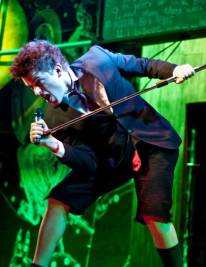 In the role that won John Gallagher, Jr. the a Best Featured Actor Tony, Williamson digs deep and comes up with the evening’s standout performance, a raging caldron of teen angst and repressed desires that reaches the boiling point in an awesomely rendered “Totally Fucked.”
In the role that won John Gallagher, Jr. the a Best Featured Actor Tony, Williamson digs deep and comes up with the evening’s standout performance, a raging caldron of teen angst and repressed desires that reaches the boiling point in an awesomely rendered “Totally Fucked.”
With her Alice In Wonderland locks and rock star vocals, Molly McCook makes for a memorable Ilse, thrown out of a hellish home but steadfastly refusing to “Do Sadness.” A spectacular Tiffany Gray (a Best Featured Actress Scenie winner for last year’s Rent) makes the absolute most of the role of abuse victim/survivor Martha, the haunting “The Dark I Know Well” a terrific vehicle for her passionate vocals. Janel Parrish (Anna), Hope Lauren (Thea), and Reesa Ishiyama (Sara) complete Wendla’s circle of female friends quite impressively indeed.
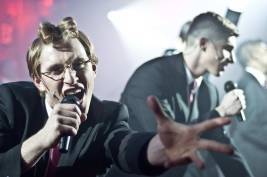 The boys couldn’t be sexier or more charismatic. Payson Lewis (as piano teacher-obsessed Georg and Ritesh Rajan (as mother-fixated Otto) make especially strong impressions, as do understudy Harrison Meloeny (funny and endearing as gay boy Ernst) and Matt Magnusson (seductive indeed as Hanschen, the object of Ernst’s affections). Meloeny and Magnusson’s extended boy-boy kissing in their amusing reprise of “The Word Of Your Body” gives Spring Awakening an added contemporary edge certain to raise Bachmann and Santorum’s hackles.
The boys couldn’t be sexier or more charismatic. Payson Lewis (as piano teacher-obsessed Georg and Ritesh Rajan (as mother-fixated Otto) make especially strong impressions, as do understudy Harrison Meloeny (funny and endearing as gay boy Ernst) and Matt Magnusson (seductive indeed as Hanschen, the object of Ernst’s affections). Meloeny and Magnusson’s extended boy-boy kissing in their amusing reprise of “The Word Of Your Body” gives Spring Awakening an added contemporary edge certain to raise Bachmann and Santorum’s hackles.
The entire bevy of adult roles go to esteemed stage-and-screen actors Foster and (two-time Scenie winner) Lester, the pair of whom have great fun bringing to life various parents and teachers, with Lester showing particularly ample vavoom as piano instructor Fräulein Grossenbustenhalter.
Michael David, Veronica Dunne, Christopher Higgins, and Alyce Tawil provide onstage backup singing, with a special tip of the hat to Higgins for giving his understudy, ensemble member Meloeny, his very own night to shine as Ernst.
None of the above would be possible without Sullivan’s inspired direction and the contributions of musical director extraordinaire Rachael Lawrence (playing keyboards and harmonium and conducting a gifted seven-piece orchestra* gloriously heavy on strings) and some of L.A.’s finest design talents.
Stephen Gifford’s terrific multi-level scenic design backs scenes with astral constellations, a suspended-in-air high-school blackboard/song list, and assorted knickknacks, its wood planked-floors ideal for the whole lot of foot stomping going on. (Like the Broadway original, Gifford’s set provides onstage seating for a dozen or so audience and ensemble members.) Brandon Baruch’s lighting design is among the most dazzling you’ll see all year, with lights provided by PRG. Jessica Lively’s fabulous costumes manage to give period garb a contemporary feel. Drew Dalzell’s impeccable sound design expertly mixes amped vocals and instrumentals.
John Bradley Stamey is assistant director and Sammy Ross assistant lighting designer. Make-up is by Jill Pugh. Ashley Boehne Ehlers is stage manager, Monica Miklas production manager, and Sullivan executive producer. Casting is by co-producer Tamara Hunter.
With rights to Spring Awakening now being released to regional and school theaters across the country, we can expect to be seeing many more big and small-stage productions over the coming months. Over The Moon’s magnificent downscaling of the Broadway original sets the bar for future productions very high indeed.
*Lawrence and Cassie Nickols (keyboard/harmonium), Ameenah Kaplan (drums/percussion), Ben Jindra (bass), Mike Wendland (guitar), Eric Schulman (violin), and Robert Lee (cello)
The Theatre of Arts Arena Stage, 1625 N. Las Palmas, Hollywood.
http://overthemoonproductions.virb.com
–Steven Stanley
March 22, 2012
Photos: Kat Hess


 Since 2007, Steven Stanley's StageSceneLA.com has spotlighted the best in Southern California theater via reviews, interviews, and its annual StageSceneLA Scenies.
Since 2007, Steven Stanley's StageSceneLA.com has spotlighted the best in Southern California theater via reviews, interviews, and its annual StageSceneLA Scenies.







 COPYRIGHT 2024 STEVEN STANLEY :: DESIGN BY
COPYRIGHT 2024 STEVEN STANLEY :: DESIGN BY